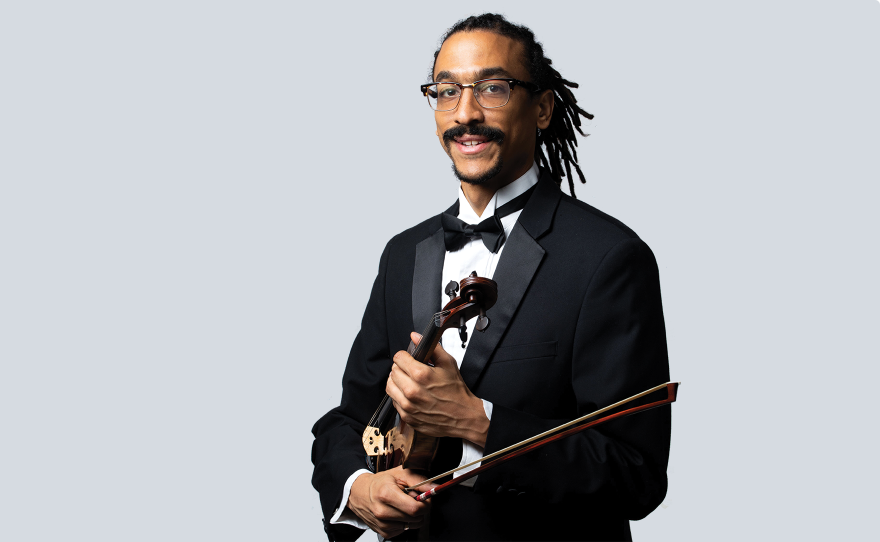Tim Jones, a 34-year-old violin virtuoso, continues to mesmerize listeners with his musical ability. The Wichita native has traveled the world playing violin, receiving his doctorate in Brazil after taking all of his exams in Portuguese. Jones maintains dual roles teaching violin at his alma mater, Wichita State, and serving as associate concertmaster at the Wichita Symphony Orchestra.
Interview highlights
Growing up in a musical family
I grew up in a musical family here in Wichita. I have four siblings and my mother had us all play the piano as young children. And then most of us also chose to branch out into other instruments.
Violin specifically, was an instrument that my older sister already played, and we always had a close connection so, I think that was a lot of what inspired me.
As a nine or ten-year-old, I already knew that I wanted to be a teacher, but when I really started taking music specifically very seriously was probably around high school. I was already in middle school playing a lot and doing a great job musically, but I think when I really knew I wanted to do this professionally was probably about age 15 or 16.

I was completing my senior year of high school and I took an audition for the Wichita Symphony and won a permanent position.
I think that there's no doubt that [growing up in a white family] did have something to do with the places that I found myself and the activities I was exposed to. My mother also really tried to put me in touch with the Black community and expose me to all different cultures, but certainly, it did make me a little more likely to find myself involved in classical music.
Deep connection with music, playing the violin, math and science
What I find so beautiful about music personally is the deep connection that it has to math and science. I feel that our art as musicians is so powerful because we really bridge between these worlds. Most of us aren't thinking about math while we're performing, but ultimately everything we do comes back to that. So when I'm playing, I just love to savor the fact that, the strings vibrating and the wood resonating and everything that's going on has physics and math beneath it. I don't know if this comes across in my playing, but I take great joy in this fact.
Tim Jones, Assistant Professor of Music at Wichita State University
I love what I do. I love my job. I am so grateful to be in this position in this city to be able to give back to this community that gave so much to me. I, like many people, would have been surprised if you had told me that this is where I would end up a few years ago, but it makes so much sense. It's such a great place to be.
Tim, Jones, Associate Concertmaster of the Wichita Symphony Orchestra
I am the associate concertmaster, so I sit with the concertmaster. We sit just to the left of the conductor. The concertmaster has a wealth of responsibilities above and beyond what most musicians have to deal with. And this is a role that I take upon myself sometimes, as the associate concertmaster, I do fill in for the concertmaster if ever she's not able to be there or engaged in any kind of other activity. So, both of us are responsible for physically leading the orchestra. We are sort of a liaison in between the conductor and the orchestra, and this is true, both musically and administratively.

Learning Portuguese — Brazilian connection
I lived with Brazilians in LA for a year. This is where I learned Portuguese and I really had my heart set on living in Brazil. So I chose to do my doctorate there. It seemed like a very good way to commit, to really experiencing a culture and not just visiting. I am married to a Brazilian so there's just so much in my life that connects me to that country.
Engaging Children with Classical Music
I really think that most kids would love music of any kind and even classical music. If they were just exposed to it by a teacher who really enjoys what they're doing. I have not met a lot of kids who don't think it's fun to play an instrument. I haven't met a lot of kids who don't like to listen to music. So I've always loved working with kids. I think that we've seen countless times all over the world, that music is a tool which enables kids to focus, to develop critical thinking skills, to develop discipline. These things have been proven time and time again. So for me, I just like to meet kids where they're at, find out what they like.



